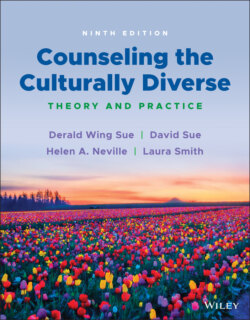Читать книгу Counseling the Culturally Diverse - Laura Smith L. - Страница 87
RELATIONAL DIMENSION
ОглавлениеIn general, the United States can be characterized as an achievement‐oriented society, which is strongly manifested in the prevailing Protestant work ethic. Basic to the Protestant work ethic is the concept of individualism: (a) the individual is the psychosocial unit of operation; (b) the individual has primary responsibility for his or her own actions; (c) independence and autonomy are highly valued and rewarded; and (d) one should be internally directed and controlled. In many societies and groups within the United States, however, this value is not necessarily shared. Identification with others in Japan and China extends widely throughout the family and is also linked to the past (as in ancestor worship). Obeying the wishes of ancestors or deceased parents and perceiving one's existence and identity as connected to the historical past are inseparable parts of one's own identity. In fact, most racial/ethnic groups in the United States tend to be more collateral or collectivistic than do White European Americans in their relationships with people. In an individualistic orientation, the definition of the family tends to be linked to well‐defined biological first‐degree relatedness (as in the nuclear family), whereas a collateral or lineal view prioritized various concepts of the extended family. Not understanding this distinction and the values inherent in these orientations may lead a family therapist to erroneous conclusions and decisions.
Counselors may fail to realize that, for example, an American Indian family network may be structurally open and understood to include several households of relatives and friends along both vertical and horizontal lines, all of whom are considered as brothers and sisters. Likewise, African Americans have strong kinship bonds that may encompass both blood relatives and friends. Traditional African culture values the collective orientation over individualism (Franklin, 1988; Hines & Boyd‐Franklin, 2005). This group identity has also been reinforced by what many African Americans describe as the sense of “peoplehood” that developed as a result of the common experience of racism and discrimination. In a society that has historically been destructive of the Black family, near and distant relatives, neighbors, friends, and acquaintances have arisen in an extended family support network (Black, 1996). Thus, in their therapist's view, a Black family may appear to be configured differently from the conventional nuclear family. The corresponding danger is that corresponding value judgments made by a White therapist may be totally without merit and/or may be translated in such a way as to alienate or damage the self‐esteem of African Americans. For example, the absence of a father in a Black family does not mean that the children do not have a father figure—this function may be filled by another relative or family friend.
